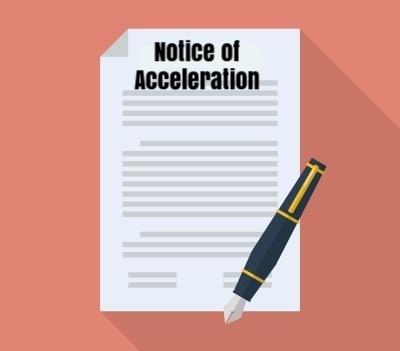 Have you recieved a Notice of Acceleration from your lender?
Have you recieved a Notice of Acceleration from your lender?
It could also be called a Notice of Intent to Accelerate, Acceleration Notice, Demand Letter, Default Letter, Notice of Default or even Notice of Default and Acceleration.
What does it mean?
In contract law, an acceleration clause is a “term that fully matures the performance due from a party upon a breach of the contract.”
For mortgages that have an acceleration clause (most do), that means that, after breaching your contract by missing payments, your lender can demand that you either pay off the entire balance of your mortgage or be foreclosed upon.
The Notice of Intent to Accelerate is warning you that's what will happen if you don't “cure the default” within a certain amount of time. But it also tells you that you have the right to cure the default and avoid acceleration and foreclosure by reinstating your loan by paying them for all your missed payments, plus fees.
Here's an excerpt from a Notice of Intent to Accelerate from Bank of America to a homeowner:
“The loan is in serious default because the required payments have not been made...You have the right to cure the default...If the default is not cured on or before Oct. 20, the mortgage payments will be accelerated with the full amount remaining accelerated and becoming due and payable in full, and foreclosure proceedings will be initiated at that time. As such, the failure to cure the default may result in the foreclosure of your property. If your property is foreclosed upon, the Noteholder may pursue a deficiency judgment against you to collect the balance of your loan.”
All of that information is required to be given in the notice banks provide to a homeowner after a default. It's in paragraph 22 of many mortgages.
Here is an example of the language in a mortgage that deals with notices of default and acceleration:
“The notice shall specify:
(a) the default;
(b) the action required to cure the default;
(c) a date, not less than 30 days from the date the notice is given to Borrower, by which the default must be cured; and
(d) that failure to cure the default on or before the date specified in the notice may result in acceleration of the sums secured by this Security Instrument and sale of the Property...”
The lender is also required to tell the borrower the exact amount of money they need to pay to reinstate their loan. If they fail to do that, or to send a notice at all, or to meet any of the other requirements of the mortgage or the law, foreclosure defenses can be claimed that could get the foreclosure lawsuit dismissed.
Reinstatement Is Not an Option for Most Homeowners
Most homeowners fall behind on their mortgage because of a hardship such as loss of income, illness, or divorce that leaves them unable to make their monthly payments. The amount of money the Notice of Acceleration asks them to pay to reinstate, which can be tens of thousands of dollars or more, is not within their means. And paying off the entire balance of their loan after it has been accelerated, which can be hundreds of thousands of dollars, is not realistic.
The only option most people have for keeping their home after defaulting is to get a loan modification, which will reinstate the loan with different terms, and allow them to begin making monthly payments again.
A loan modification can make your loan better than it was before by reducing the interest rate, extending the loan term, and/or reducing the principal you owe to bring your payment down.
Getting a loan modification is a difficult process for most homeowners. The bank often asks for the same documents multiple times, then denies the application. It's a good idea to hire an experienced attorney to help you complete the Request for Mortgage Assistance (RMA) and deal with the bank on your behalf.
An attorney can also help keep you out of foreclosure for as long as possible, by raising defenses based on problems with the Notice of Intent to Accelerate, for example. That can give you more time to work toward a loan modification or a foreclosure alternative, such as a deed in lieu of foreclosure or short sale.










